








Common abbreviations and defined terms that are used in this Report. Defined terms are written using capital letters.
Abbreviation/term Full terminology/definition
Bid
Bidder
BMCs
CDB
CIPS
An offer, by a Bidder, in response to an Invitation to Bid or equivalent, to provide the required Goods, Works or Non-Consulting Services
A Firm or Joint Venture that submits a Bid for the provision of Goods, Works, or NonConsulting Services in response to an Invitation to Bid or equivalent
Borrower Member Countries
Caribbean Development Bank
Chartered Institute of Procurement and Supply
CQS Consultants’ Qualifications Selection
Consultant
Private and public entities, including, amongst others, Consulting Firms, engineering Firms, construction managers, management Firms, PAs, inspection agents, auditors, United Nations (UN) Agencies and other regional and multinational organisations, investment and merchant banks, universities, research institutions, government agencies, NGOs, as well as individuals, that provide Consulting Services. Where the Consultant is an individual and they are not engaged by the Recipient as an employee.
Consulting Services Consulting Services are those advisory or intellectual services delivered by a Consultant Firm or an Individual Consultant
Core Procurement Principles
CPTP
CIPS
DS
Electronic Government Procurement (e-GP)
EOI
FBS
GCF
Goods
Goods, Works, and Services
The Core Procurement Principles of Value for Money, Economy, Efficiency, Integrity, Equality and Fairness and Transparency, which govern all procurement under CDB Financing, as detailed in Section 3 of the Policy
Caribbean Procurement Training and Consultancy Programme
Chartered Institute of Procurement and Supply
Direct Selection
The use of information technology (especially the internet) by government institutions and other public sector organisations in conducting and managing their procurement activities and relationships with providers of Goods, Works and Services required by the public sector.
Expression of Interest
Fixed Budget Selection
Global Climate Fund
Includes commodities, raw materials, machinery, equipment, vehicles, Plant and equivalent. The term may also include related services, such as: transportation, insurance, installation, commissioning, training, or initial maintenance.
Goods, Works, Non-Consulting Services and Consulting Services
Common abbreviations and defined terms that are used in this Report. Defined terms are written using capital letters.
Abbreviation/term Full terminology/definition
HOP Heads of Procurement
ICB International Competitive Bidding
ICS Individual Consultant Selection
IFAD International Fund for Agriculture and Development
IDB Inter-American Development Bank
Implementing/Executing Agency
An entity appointed by the Recipient to carry out the Project and provide its day-to-day management.
INGP Inter-American Network on Government Procurement
LCS Least Cost Selection
MAPS
OECD Methodology for Assessing Procurement Systems
MDB Multi-Lateral Development Bank
MC Member Country
Member Country CDB’s Member Countries are those that are described in Annex II, as updated from time to time.
Non-Consulting Services Services which are not Consulting Services. Non-Consulting Services are normally Bid and contracted based on performance of measurable outputs, and for which performance standards can be clearly identified and consistently applied. Examples include drilling, aerial photography, satellite imagery, mapping, and similar operations.
OAS Organisation of American States
OECS Organisation of the Eastern Caribbean States
OECSC Organisation of the Eastern Caribbean States Commission
Policy The Procurement Policy for Projects Financed by CDB, as amended from time to time.
PPU Procurement Policy Unit
Procedures The Procurement Procedures for Projects Financed by CDB, as amended from time to time.
Procurement Cycle
The Procurement cycle considers the key steps when procuring Goods, Works, and Services, including need identification, planning, approaching the market, evaluation of offers, contracting, contract management and incorporating lessons learned into future procurements.
Procurement Framework The Policy and the Procedures, as amended from time to time.
QCBS Quality and Cost Based Selection
QBS Quality Based Selection
Common abbreviations and defined terms that are used in this Report. Defined terms are written using capital letters.
Abbreviation/term Full terminology/definition
WB World Bank
Works
UKCIF
UNCTAD
UNOPS
USD
A category of procurement that refers to construction, repair, rehabilitation, demolition, restoration, maintenance of civil work structures, and related services such as transportation, insurance, installation, commissioning, and training.
United Kingdom Caribbean Infrastructure Partnership Fund. The Fund provides grant funding for infrastructure projects in eight Caribbean countries eligible for Overseas Development Assistance, and one UK Overseas Territory. CDB is the implementing partner for the Fund.
United Nation Trade and Development Agency
United Nations Office for Project Services
United States Dollars

Figure 1 - Total Annual Value of Awarded Contracts, 2017-2024
Figure 2 - Total Procurement Value, by Contract Type in 2024
Figure 3 - Percentage of Contracts Awarded within the Region, vs Outside in 2024, by Category of Contract
Figure 4 - Number of Contracts Awarded in 2024, by Country of Award
Figure 5 - Distribution of Contracts Awarded in Country vs Outside in 2024, by Country of Awarded Contracts
Figure 6 - Distribution of Contract Value Awards by Group of Countries, 2020-2024
Figure 7 - Total Value of Awards to CDB Non-Member Countries, 2020-2024
Table 1: Top 10 Countries by Total Value of Contracts Awarded to Firms and Individuals Registered in Country
Table 2: Top 10

The Caribbean Development Bank (CDB, the Bank) is pleased to present its third Annual Procurement Report. It provides an overview of the Bank’s procurementrelated performance, key initiatives, and results achieved during 2024.
In alignment with the Core Principle of transparency that underpins CDB’s Procurement Framework, the Report serves two primary purposes:
• To provide stakeholders with key data and insights on procurement activities carried out by CDB’s Clients under Bank-financed projects; and
• To present a comprehensive account of CDB’s initiatives to strengthen procurement systems, advance procurement reform, and promote private sector participation in procurement across its Borrowing Member Countrie (BMCs). This includes updates on institutional partnerships, technical assistance, and outreach efforts.
We trust that this Report will serve as a valuable resource for our stakeholders, offering greater visibility into CDB’s procurement framework, activities, and evolving priorities.
We welcome your feedback, which is vital to continuously improving the quality, relevance, and impact of future editions.
Please direct comments or inquiries to: procurement@caribank.org

Public procurement plays a pivotal role in delivering results across CDB-financed projects, serving not only as a compliance function but also as a strategic enabler of development outcomes.
At CDB, the procurement function extends well beyond traditional due diligence oversight for the acquisition of goods, works, and services. Recognising that effective procurement is fundamental to sound project management, CDB’s procurement professionals are engaged from the earliest stages of project preparation Their involvement ensures that robust and fit-for-purpose procurement arrangements are embedded in project planning, enabling CDB BMCs to efficiently source inputs and deliver results on time and within scope.
From the start of the procurement cycle and throughout the lifecycle of a project, dedicated procurement staff serve as integral members of CDB project teams. They work hand-in-hand with Executing Agencies in country, offering technical advice, building capacity through training, and providing hands-on guidance during implementation. This collaborative approach strengthens procurement execution and helps mitigate common risks related to delays or non-compliance.
Sections 1 and 2 of this Report provide an overview of the procurement function within CDB, highlighting key developments in 2024 to enhance CDB’s procurement framework, systems, and tools.
However, procurement challenges persist. Limited market participation, the need for further national procurement reform, the slow introduction of e-procurement solutions, and institutional capacity constraints continue to hinder timely and effective project delivery in some contexts. CDB addresses these barriers through a multi-faced strategy that combines systemic reform at country level, capacity building, and market engagement .
A key pillar of this strategy is the recognition of the private sector as an indispensable partner in achieving high-quality procurement outcomes. As shown in the 2024 contract data analysis (Section 2), CDB-financed projects continue to benefit from strong participation by local and regional vendors, consultants, and contractors, while also seeing growing interest from international bidders. This trend reinforces the importance of engaging the market early and ensuring that all potential participants - especially
those from within the Region - are well-informed about CDB-financed opportunities and equipped with the tools to compete effectively. In doing so, CDB not only enhances procurement outcomes but also supports the growth of a dynamic and resilient private sector across the Caribbean
To this end, the Bank has placed increased emphasis on market outreach initiatives, including workshops, procurement fairs, and dedicated private sector engagement events. These initiatives are designed to raise awareness, strengthen bidder capacity, and align private sector offerings with the evolving needs of CDB’s project beneficiaries. By fostering stronger linkages between public sector demand and private sector supply, CDB aims to make procurement more inclusive, competitive, and development-focused.
Complementing these efforts, CDB continues to provide direct technical assistance to its BMCs and regional institutions seeking to modernise their procurement systems and enhance the capacity of procurement professionals. Key initiatives and achievements in this area during 2024 are detailed in Section 3 of this Report. Strengthening national procurement systems is essential to enabling countries to harness the full strategic value of public procurement. In the Caribbean - where public procurement accounts for a significant share of the national Gross Domestic Product (GDP) well-functioning systems are critical for achieving greater value for money, particularly amid ongoing fiscal constraints. More broadly, sound public procurement serves as a powerful lever for inclusive and sustainable development. It can advance national priorities such as environmental sustainability, gender equality, and the empowerment of marginalised groups, thereby contributing to more resilient and equitable economies.
CDB recognises that such outcomes cannot be achieved in isolation. Strategic partnerships with other development institutions and regional actors are key to advancing procurement reforms and innovation The Bank collaborates closely with these partners to support country reform efforts - such as the development of national e-procurement platforms, adoption of sustainable procurement policies and practices, and collaborating in the delivery of dedicated training and workshops to strengthen institutional and professional procurement capacity. In CDB’s operation, such collaboration occurs at both project and regional levels. At the project level, it might include leveraging mutual reliance arrangements and the use of consolidated procurement mechanisms such as regional pooled procurement platforms. At the regional level, CDB plays a pivotal role in connecting procurement professionals across its BMCs, including by supporting their participation in regional networks, technical workshops, and other platforms for knowledge exchange and learning. These partnerships, essential to driving forward a shared agenda for procurement excellence across the Caribbean, are highlighted throughout this Report.


SECTION 1
CDB’s Procurement Framework consists of CDB’s Procurement Policy1 (“the Policy”) and Procurement Procedures2 (“the Procedures”). This Procurement Framework was introduced in 2019 and updated in 2021. It is applicable to projects in CDB client countries approved on or after November 1, 2019 and replaced the previous procurement guidelines. The Framework is harmonised with those of other Multilateral Development Banks (MDBs) operating in the Region. It seeks to promote the use of best international procurement practices and deliver value for money, while upholding the highest standard of integrity, in order to provide the intended development outcomes in a timely and effective manner.
CDB’s Procurement Policy establishes the core principles and requirements governing procurement activities undertaken by recipient/beneficiaries of CDB financing (i.e. CDB client countries). The Procurement Procedures operationalise the Policy and provide detailed guidance on the relevant procedures that govern the procurement of Goods, Works and Services required for projects. Additionally, CDB’s Standard Procurement Documents (SPDs) and Procurement Guidance Notes support and complement the Procurement Framework. In order to ensure that its clients and relevant
CDB staff are trained on the aforementioned Procurement Framework, CDB has introduced a set of online self-learning courses, which are blended with regular interactive online or “face-to-face” training. In addition, at the start of new projects, CDB usually holds a Procurement Workshop. This ensures that the benefits of the Procurement Framework are fully exploited, and that the relevant procurement requirements are observed.

CDB’s Procurement Policy and Procedures can be found at: Procurement Policy and Resources | Caribbean Development Bank (caribank.org) The Bank’s website also provides access to procurement information and resources such as procurement notices, standard procurement documents, guidance notes and contract awards.
Under CDB’s Procurement Framework, only firms and individuals from its Member Countries3 can participate in procurement for projects funded by CDB. Exceptionally, eligibility may be expanded, as provided for in CDB’s Procurement Framework or with the approval of CDB’s Board of Directors.
(1) Procurement Policy for Projects Financed by CDB (December 2019)
(2) Procurement Procedures for Projects Financed by CDB (January 2021)
(3) These consist of nineteen (19) Borrowing Member Countries (i.e. BMCs) that are allowed to borrow funds from the Bank and also have voting rights: Borrowing Members | Caribbean Development Bank (caribank.org) and nine (9) Non-Borrowing Members that provide capital and have voting rights: Non-Borrowing Members | Caribbean Development Bank (caribank.org)
Being responsible for the implementation of a Project, the Recipient of a CDB loan or grant is tasked with conducting the entire procurement process, while ensuring compliance with the provisions of the financing agreement and with the relevant procurement Policy, Procedures and documents. For its part, CDB carries out a procurement oversight and advisory function seeking to maximise the value for money realised. Importantly, CDB ensures that its financing is used only for the purposes for which it was granted, with due attention to considerations of economy and efficiency as required by the Agreement Establishing CDB. Specifically, the Procurement oversight function at CDB consists of the Supervising Officers from the relevant Division or Unit, with support from the Procurement Policy Unit (PPU), in the Projects Department. The former are responsible for providing required no-objections at key stages of the procurement cycle and contract supervision, whereas PPU provides procurement technical advice and training and reviews for higher value/risk contracts.
Project implementation constitutes a key challenge on CDB financed projects, as reported by the recent CDB’s portfolio reviews assessments and Development Effectiveness Review Reports. In particular, these and other analyses have highlighted the need to strengthen the procurement capacity of CDB’s clients to facilitate more efficient and effective procurement processes.
Over the past years, CDB has therefore supported its clients by providing additional procurement resources, including templates, guidance notes and trainings on its procurement framework. These efforts have included the development of a set of Evaluation Guidance Notes and tools to support clients in carrying out evaluation of bids and proposals. CDB has also provided specific training to support its clients in this area, which experience has proven to be a rather problematic stage in the procurement cycle, and thus prone to inefficiencies and delays. CDB efforts to improve its own procurement framework dovetail with the broader work of the Bank in supporting procurement reforms and capacity building at a national level (see Section 3 for more details), as it is expected that more effective national procurement systems
will lead to improved procurement and project outcomes on CDB-funded projects.
In 2024 CDB sought to further strengthen the implementation of its procurement framework, including by revising its own procurement documents and collaborating with other MDBs. Specific actions are detailed below.
Templates
• Development and Update of Standard Bidding Documents (SBDs) for Design and Build Contracts: CDB has developed a new Standard Bidding Document (SBD) for the Procurement of Works using the Design and Build approach – OneStage, Two-Envelopes version. In parallel, the existing Two-Stage, Two-Envelopes Design and Build SBD has been updated to incorporate enhancements identified during the development of the new document. Both SBDs are based on the International Federation of Consulting Engineers (FIDIC) “Yellow Book” and incorporate CDB’s Particular Conditions of Contract. Looking ahead, CDB also plans to develop a Two-Envelopes version of the existing OneStage Large Works SBD in 2025 to facilitate the use of rated criteria whereby the technical submission is subject to scoring.
• Revisions to Standard Bidding Documents (SBDs) for Goods and Works: All SBDs for the Procurement of Goods and Works have been revised to explicitly allow the Purchaser to waive minor deviations in the qualification criteria, provided these do not materially affect a Bidder’s ability to perform the contract. This revision aligns the SBDs with the approach adopted in CDB’s Standard Prequalification Documents, promoting greater consistency and flexibility in the evaluation process.
• Finalisation of the Expression of Interest (EOI) Submission Template for Firms: In 2023 CDB developed and piloted an Expression of Interest (EOI) Submission Template for Firms, aimed at standardising and streamlining EOIs submissions in response of a Request for Expression of Interest

(REOI) notice, and facilitating a uniform approach to the subsequent client’s evaluation of EOIs, before the Proposal stage4. Following the pilot of the template in 2023, CDB has then refined and enhanced the template in 2024, informed by feedback and lessons learned during the pilot phase. An internal working group in CDB Projects Department led this effort, identifying areas for improvement to better support both clients and consultants. The finalised template was published on CDB’s website and is now routinely used in the procurement of consulting services. Its use has significantly improved the quality of EOI submissions received by CDB’s clients and has contributed to a more efficient and consistent evaluation process.
Guidance Notes
• Development of a Guidance Note on Price Negotiations. CDB has developed a new Guidance Note to provide clearer direction on price negotiations under its procurement framework. While price negotiations during open, competitive bidding for Goods, Works, and Non-Consulting Services are permitted only under exceptional circumstances, this Guidance note offers detailed guidance on scenarios where such an approach may be appropriate. The note was informed by a comprehensive survey conducted by CDB across leading Multilateral Development Banks (MDBs) to benchmark best practices in this area.
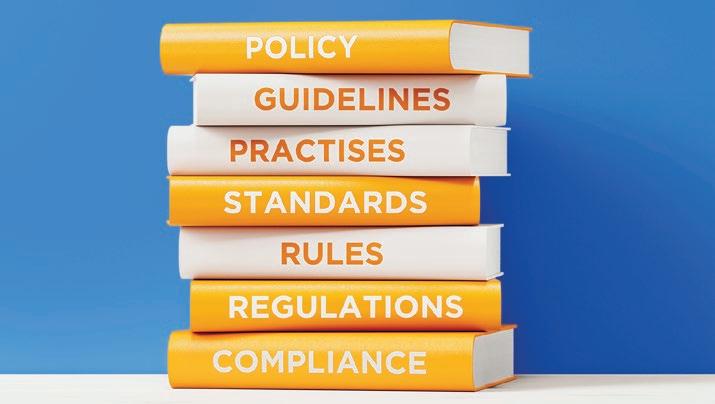
• Guidance Note on the Use of Electronic Government Procurement Systems (e-GP): When a client proposes to use an e-procurement system under a CDB-financed project, CDB must first verify that the system meets minimum acceptable standards. To support this process, CDB has developed and published a Guidance Note on the Assessment of e-Procurement Systems. This Guidance Note was produced was produced as an output of a MDB working group led by CDB’s PPU and has been formally approved and adopted by all 15 members of the MDB Heads of Procurement (HOP) group. The note outlines the criteria and process for outlines the criteria and process for assessing the assessing the suitability of e-procurement platforms for use in projects financed by CDB and other MDBs. All requests for the use of new e-procurement systems should be referred to the PPU for assessment and approval. To date, CDB has approved the use of the national e-procurement systems of both the Government of Jamaica and the Government of Saint Lucia under its funded projects.
• Internal Capacity Building on Gender-Related Requirements in Large Works Contracts: In 2024, CDB’s PPU and Social Sector Division (SSD) jointly delivered a series of virtual sessions focused on strengthening the supervision and management of gender-related requirements in large infrastructure works contracts . These sessions aimed to build staff capacity to effectively apply and monitor gender provisions included in existing contract clauses. Without appropriate gender considerations, infrastructure projects risk reinforcing existing inequalities; therefore, CDB’s SBDs for Large Works include Particular Conditions that require contractors to implement specified gender mitigation strategies. The training sessions targeted staff involved in the procurement
and implementation of infrastructure projects— including engineers, social analysts, education officers, and procurement officers—to ensure a cross-functional understanding of how to integrate gender considerations throughout the project lifecycle.
During the last year, CDB also initiated efforts to enhance the gender-responsive clauses included in its Large Works Standard Bidding Documents. As part of this process, initial internal and external consultations were held to gather insights on their experiences with implementing these clauses in practice. The discussions focused on the ease with which contractors have been able to comply with gender-related requirements in CDB-financed projects, the challenges they may encounter, and the types of support or actions needed to facilitate meaningful implementation. Looking ahead, CDB will continue engaging with stakeholders to ensure that gender-responsive provisions are not only included in bidding documents, but also effectively implemented in infrastructure works programmes.
• Launch of the Procurement Service Desk: In March 2024, CDB launched a new Procurement Service Desk to streamline the internal review and No Objection process for procurement documents submitted by CDB’s clients . Hosted on the Jira Atlassian platform, the Service Desk centralises various procurement-related requests to PPU, including Prior Review submissions, Publication Requests, enrolment in Procurement e-Learning Trainings, and Frequently Asked Questions. It also provides a single access point for relevant templates related to Bank-managed consultancies, enhancing efficiency and accessibility for CDB staff.
• Development and Rollout of the New Procurement Management System Portal: Building on the improvements introduced through the Procurement Service Desk, CDB made substantial progress during Q3 and Q4 of 2024 in developing a new Procurement
Management System Portal. Hosted on CDB’s internal OP365 project management platform, this system is designed to further streamline and digitise the Bank’s procurement processes
Under Phase 1 of the project, the new portal will be fully launched for CDB staff in March 2025. It replaces the PPU Service Desk for the majority of CDB-financed projects—excluding the Basic Needs Trust Fund (BNTF) and Use of Funds (UOF) projects. Through this new system, CDB staff can seamlessly submit requests for prior review of procurement documents, as well as publication requests for open competitive bidding and other procurement activities requiring publication.
Key features of the new system include:
• Enhanced communication with stakeholders through clearer, more timely, and effective interactions;
• Improved collaboration among team members, with future capabilities for interaction with external clients;
• Standardisation of task execution and improved tracking of key timelines;
• Better monitoring of no-objection processes and overall quality of exchanged documentation; and
• Increased capacity for real-time project supervision and analytics.
Throughout 2024, CDB undertook a rigorous development and testing process, culminating in the completion of PPU’s Quality Assurance (QA) review in October 2024. To support the transition, comprehensive training materials— including user guides, training sessions, and instructional videos—were made available to staff.
(5) CDB clients do not access the system directly; instead, procurement documents are submitted to the relevant CDB Project Officer, who then uploads them to the platform and initiates the request to PPU, as appropriate.
With Phase 1 now successfully completed, CDB is advancing toward Phase 2: the launch of the Client Portal. This upcoming phase will enable direct, end-to-end engagement with Executing Agencies in CDB’s BMCs.
Once implemented, it is expected to significantly enhance the Bank’s efficiency and effectiveness in managing procurement processes across its portfolio.
These enhancements represent a significant milestone in CDB’s ongoing digital transformation efforts, aimed at fostering clearer, timelier, and more effective communication and collaboration throughout the procurement process.
• Register of Consultants System (ROCS) Enhancement
In 2024, PPU, in collaboration with the Information and Technology Solutions Division (ITSD), launched a project to redevelop and modernise the Register of Consultants System (ROCS), CDB’s platform for identifying and engaging individual consultants and consulting firms for assignments under Bankfinanced projects, as well as for CDB’s own internal needs.
The previous ROCS platform, which was hosted on CDB’s intranet, ceased to function in mid-2023 following the retirement of its underlying IT infrastructure. While the system was decommissioned, CDB retained access to the existing consultant records and has continued to utilise this information for consultant identification and selection processes6
The new ROCS platform is being designed with a user-friendly interface and enhanced functionality, aimed at improving the experience for both internal users and external consultants. Key planned features include:
• Streamlined consultant registration and profile management
• Advanced search and filtering tools to support more targeted consultant identification
• Improved data analytics and reporting capabilities to support procurement decision-making
• Integrated conflict of interest declarations and eligibility screening tools
• Potential for future integration with procurement dashboards and performance tracking tools
Once the new system is launched, consultants previously registered in ROCS will be contacted and invited to update their profiles. In the meantime, consultants who are not currently registered but wish to be notified once the platform goes live can express their interest by writing to procurement@caribank.org with the subject line “Register of Consultants.”
This initiative reflects CDB’s commitment to strengthening its procurement tools and digital systems to better support efficient, transparent, and competitive consultant selection processes.
In 2024, CDB continued to work on a project to review its monetary thresholds for International Competitive Bidding (ICB) applied to the procurement of Goods, Works, and Services
These thresholds, initially set in 2021, are subject to periodic review to ensure they remain appropriate in light of current market conditions and evolving procurement practices. The objective of the review was to ensure that thresholds:
• Reflect prevailing market dynamics, including inflationary trends and supply chain challenges;
• Remain aligned with the practices of other MDBs; and
• Maximise efficiency by applying ICB procedures where international competition is likely to generate tangible benefits.
CDB’s thresholds are tailored by Client country, based on risk and capacity considerations. The threshold level determines when international advertising is required, triggering more complex procurement procedures that,
(6) It is important to note that consultant’s registration on ROCS does not imply an endorsement or recommendation by CDB of any specific consultant, as CDB follows open and transparent procurement processes when selecting consultants. Similarly, registration on ROCS does not guarantee the award of contracts nor is required for consultants to participate in CDB’s procurement opportunities.

while aiming at enhancing competition, can also extend procurement timelines and increase administrative costs. As such, the use of ICB where foreign participation is unlikely may not yield additional value for money.
An analysis of ICB contracts awarded under CDB-funded projects between 2018 and July 2023 found that:
• Foreign participation tends to increase consistently in higher-value contracts, often of specialised nature, particularly above USD 1.5 million.
• Within the USD 1M–1.5M range, contracts consistently received at least one foreign bid, but competition remained limited (typically no more than two bids).
• For both the Goods and Works categories, no evidence was found that lowering the current thresholds would increase competition in a meaningful way.
• Contract value is not the sole factor influencing foreign participation; the nature of the goods or works is also a key determinant.
• In the case of Works contracts, although foreign firms may participate, awards predominantly went to local contractors.
Due to dataset limitations, especially for the Goods category, CDB is currently expanding the analysis by incorporating ICB data from other MDBs active in the Region. This will enhance the robustness of the findings, particularly in overlapping client countries. A comprehensive report with the final analysis and recommendations is expected to be published in the coming months.
In 2024, CDB continued to collaborate with other development banks to harmonise procurement approaches, to improve their
institutions’ procurement policies and practices, ensuring these truly support development effectiveness results in the projects they finance.
In September 2024, CDB and the International Fund for Agricultural Development (IFAD) signed a Procurement Framework Agreement aimed at enhancing the efficiency, effectiveness, and coherence of procurement processes in jointly co-financed projects7. This milestone agreement introduces a structured approach to mutual reliance, allowing the two institutions to use each other’s procurement procedures and delegate responsibility for procurement support and oversight to one another, based on agreed conditions.
By leveraging each other’s systems, which are built on internationally recognised standards and robust fiduciary frameworks, the institutions can reduce transaction costs, avoid duplication of processes, and foster greater predictability in project implementation.
The Agreement is underpinned by the strong alignment between the two institutions’ procurement frameworks, which share core principles of economy, efficiency, transparency, fairness, competition, and accountability. It also reflects a broader commitment to harmonisation among MDBs, in support of the aid effectiveness agenda and efforts to reduce the administrative burden on partner countries.
Through streamlined procurement arrangements, the Framework Agreement is expected to improve project planning and execution timelines, provide executing agencies with greater clarity and consistency, and ultimately accelerate the delivery of development results. This collaboration represents a significant step toward more agile, coordinated, and responsive development operations, contributing to sustainable and inclusive growth across the Caribbean region. This follows the conclusion of similar agreements with the European Investment Bank (EIB), the IDB and the World Bank (WB).

In September 2024, CDB participated at the Heads of Procurement (HOP) of the Multilateral Development Banks (MDBs) annual meeting, hosted by the European Bank for Reconstruction and Development (EBRD) in London from September 18th to 20th.
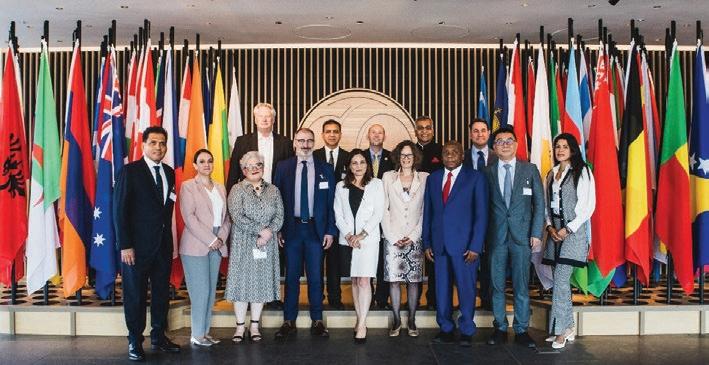

Key agenda items included strategies to diversify the supply base for companies participating in MDB-financed procurement processes; the promotion of Value for Money (VfM) principles through outreach to governments and market stakeholders; and the development of robust measures to mitigate cybersecurity risks in procurement.
Discussions also focused on enhancing supply chain traceability, particularly in the photovoltaic and other sensitive industries, to ensure goods financed by MDBs are free from forced labor.
The HoPs also emphasised the importance of strengthening procurement and contract management capacity within implementing agencies. A key takeaway was the need for higher-quality feasibility studies at the outset of projects to better align procurement strategies with what the market is able and willing to offer, ultimately leading to more realistic and effective contracts. As part of the event, a Sustainable Public Procurement (SPP) Forum was held. The forum explored the role of the procurement cycle in supporting SPP implementation and discussed the integration of SPP provisions into contractual arrangements. Other highlights included a market engagement session with the construction sector to share challenges and successes, as well as discussions on monitoring frameworks and impact assessments for SPP practices.
• MDBs Working Groups
In 2024, CDB participated in the following MDBs Working Groups:
• E-Government Procurement (e-GP). Aims to support the adoption and enhancement of e-GP systems across BMCs of participating MDBs, including by harmonising e-GP standards and guidelines for use in MDBfunded projects, providing technical support, and facilitating capacity building and knowledge sharing on international best practices.
• Sustainable Public Procurement (SPP). Supports the development concepts, strategies, and action plans for SPP to actively promote environmental, social, economic, and institutional sustainability outcomes across BMCs of participating MDBs. It operates through various sub-working groups, including carbon estimation, sustainable sourcing, life cycle costing, and circular procurement. The WG supports sustainable procurement at both the national public procurement system level and within project operations, aligned with each MDB’s mandate.
• Value for Money (VFM). Facilitates the development of a common understanding of VfM in procurement across participating MDBs and IFIs. It focuses on creating harmonised guidelines and practical tools for assessing and achieving VfM, ensuring that procurement decisions consistently deliver optimal results by balancing cost, quality, sustainability, and long-term outcomes.
• Renewal of FIDIC Standard Contract License
In June 2024, CDB and the nternational Federation of Consulting Engineers (FIDIC)8 renewed and expanded their existing agreement enabling CDB and its clients to use FIDIC standard contracts
under its funded projects for the next 5 years. Under the terms of the agreement, FIDIC has granted CDB a non-exclusive licence to refer to 12 major FIDIC contracts for projects they finance, and the documents will be used as part of the bank’s standard bidding documents. The list of contracts now includes the reprints of the 2022 FIDIC Rainbow Suite, the latest FIDIC Green book 2021 and the Emerald Book contract for Underground Works and the Dredgers contract. The agreement allows CDB’s Clients to use internationally recognised and balanced forms of contracts to further their project-specific and development objectives across the Caribbean region and beyond.
• CDB-UNOPS-GCF Mission to Barbados, November 2024
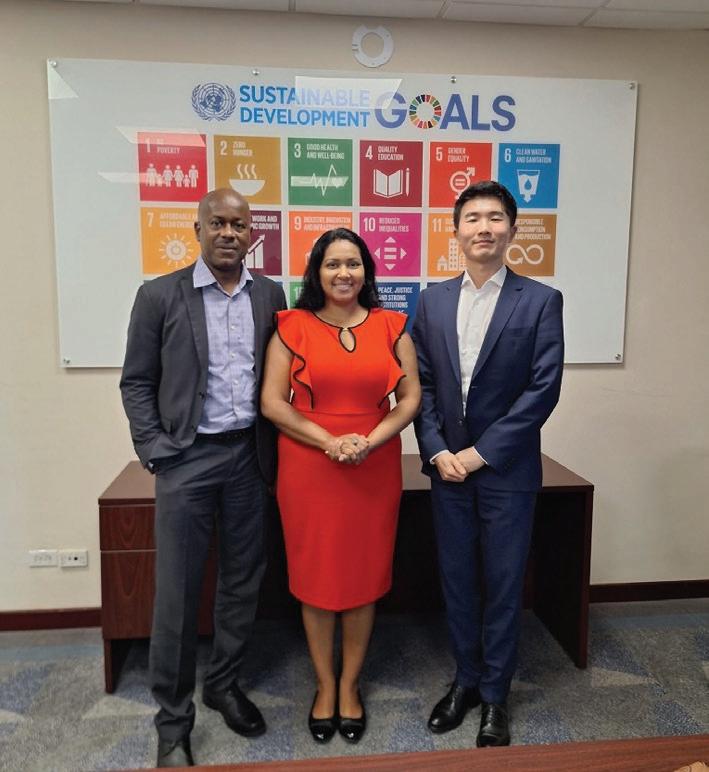
CDB participated at the 1st Global Supply Chain Forum9, organised by United Nation Trade and Development (UNCTAD) and the Government of Barbados. Held in May 2024, the Forum brought together policymakers, international organisations, and private sector actors to explore strategies for making global supply chains more inclusive, sustainable, and resilient. The event focused on leveraging trade and transport policies, digital innovation, and investment to strengthen supply chain connectivity, particularly for Small Island Developing States (SIDS) and developing economies.
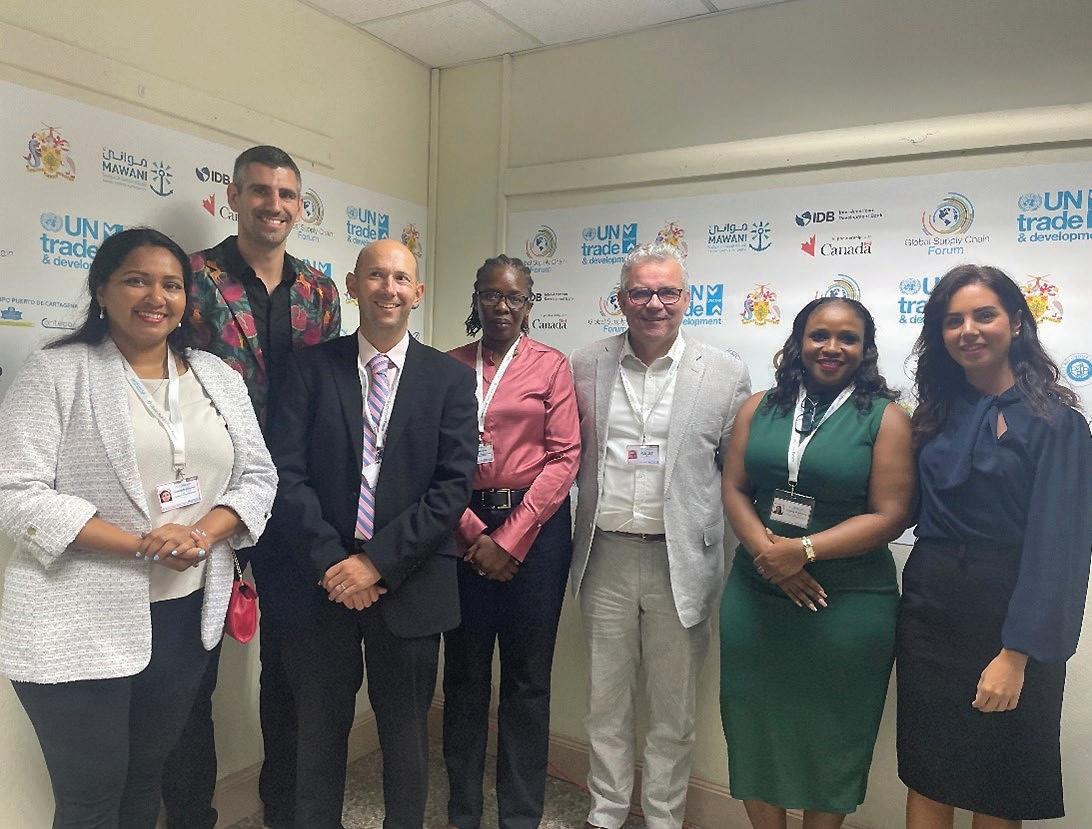
(9) About the Global Supply Chain Forum | UN Trade and Development
Strengthening Caribbean Small Island States’ Supply Chain Resilience. During the Global Supply Chain Forum held in Barbados from 21–24 May 2024, the Organisation of the Eastern Caribbean States Commission (OECSC) convened a panel to spotlight the supply chain and procurement challenges faced by Caribbean small island developing states (SIDS). The session showcased the success of the OECS Pooled Procurement Services (PPS) and explored how regional collaboration, technology, and capacity building are enhancing supply chain resilience and competitiveness.
The panel highlighted recent efforts led by OECSC, with support from multilateral donors, to modernize procurement systems in the Region. These include the operationalisation of updated procurement frameworks, professionalisation of procurement staff, and the development of a regional supply chain framework, including surge capacity for disaster response. Emphasis was placed on harmonising procurement standards, enacting supportive
legislation, and adopting agile, digital procurement systems to streamline processes and improve market efficiency.
Key recommendations from the panel included conducting regional analyses to support procurement consolidation at national, sub-regional, and regional levels, underpinned by enabling technologies and policies for pooled procurement.
Caribbean SIDS were encouraged to establish collaborative frameworks that strengthen engagement between the public and private sectors and to invest in targeted capacity-building efforts.
The panel also emphasised the importance of prioritising specific, actionable reforms—such as scaling up the successful OECS pooled procurement model—over broader, less focused initiatives.
Drawing on the ongoing OECSC–CDB–World Bank partnership, the panel reinforced how a regional approach can drive more resilient and effective supply chain systems across the OECS.



This section analyses the data related to the award of Goods, Works and Services contracts for projects funded by CDB during 2024. The data analysed in this report was extracted from CDB’s disbursement system and included all contracts awarded under CDB-funded projects (both Capital and Technical Assistance projects) subject to CDB’s no-objection.
For contracts awarded to JVs comprising firms from different countries, one contract has been allocated to each partner’s country for reporting purposes. Where contract value is reported, the total value has been divided equally between the JV partners. This approach ensures fair representation of all participating countries in the analysis.
• In 2024, the total value of all contracts awarded under CDB-funded projects was equal to approximately USD83.4million, corresponding to 193 contracts.
2024 recorded the highest number of awarded contracts in the past four years (2020–2024). This may be partly attributed to the large volume of consultancy contracts awarded under Regional projects last year: 82 in total, with a combined value of USD5.6M. These projects, typically implemented by CDB or a regional partner organisation, support interventions across multiple countries.

Despite this increase in the number of contracts, the total value of contracts awarded in 2024 was lower than the peak recorded in 2022, which was largely driven by pandemic response initiatives, and also below the total value in 2023. This decline in value can be attributed to the fact that the majority of contracts awarded in 2024 were for consultancy services, which generally involve lower financial values compared to works or goods contracts and which typically come further downstream in the project cycle. Notably, works contracts were fewer in number but significantly higher in value. Also, 2024 awards reflect a shift back to more typical procurement patterns following the heightened and concentrated procurement activities seen during the 2022-2023 period.
The highest value contract (USD43.3M) in 2024 was awarded in Dominica to a national contractor under the Loubiere to Grand Bay Road Reconstruction Project

The chart shows the distribution of contracts awarded in 2024 by Type (Works, Consulting Services, Goods/Non-Consulting Services).
• In 2024, most contracts awarded were for Consulting Services, with a total of 146 contracts valued at approximately USD14.6 million. This reflects the sustained demand for technical expertise and advisory support, including to prepare capital projects, across CDB-funded initiatives.
The Goods and Non-Consulting services category followed, with 32 contracts awarded, for a combined value of about USD8.87 million. While only 14 Works contracts were issued last year, they accounted for the largest share of total contract value (approximately USD59.9 million) underscoring the high investment typically associated with infrastructure and construction projects.

“...contracts awarded were for Consulting Services, with a total of 146 contracts valued at approximately USD14.6 million.”
These figures reflect a consistent pattern observed in recent years: Consultancy contracts make up the bulk of procurement
3 - Percentage of Contracts Awarded within the Region vs Outside in 2024 by Category of Contract
For each type of procurement contracts, the chart shows the percentage of contracts (in number) awarded to firms and individuals registered in countries located within the Region (“Regional Awards”, which includes CDB BMCs) and outside (“Non-Regional Awards”, which includes both CDB non-Borrowing Member Countries and other countries which are not member of CDB).
With respect to nationality of the winning firm or individual, the majority of consultancy contracts awarded in 2024 - 106 out of 146 were won outside the Region, representing a total value of approximately $7.5 million. However, the value of consultancy contracts awarded to Regional consultants was only slightly lower, totaling around USD7 million across 40 contracts. In contrast, Works and Goods contracts continued to be awarded predominantly to regional or domestic contractors and suppliers, with external providers typically participating and succeeding in procurement processes involving specialised or highly technical assignments.
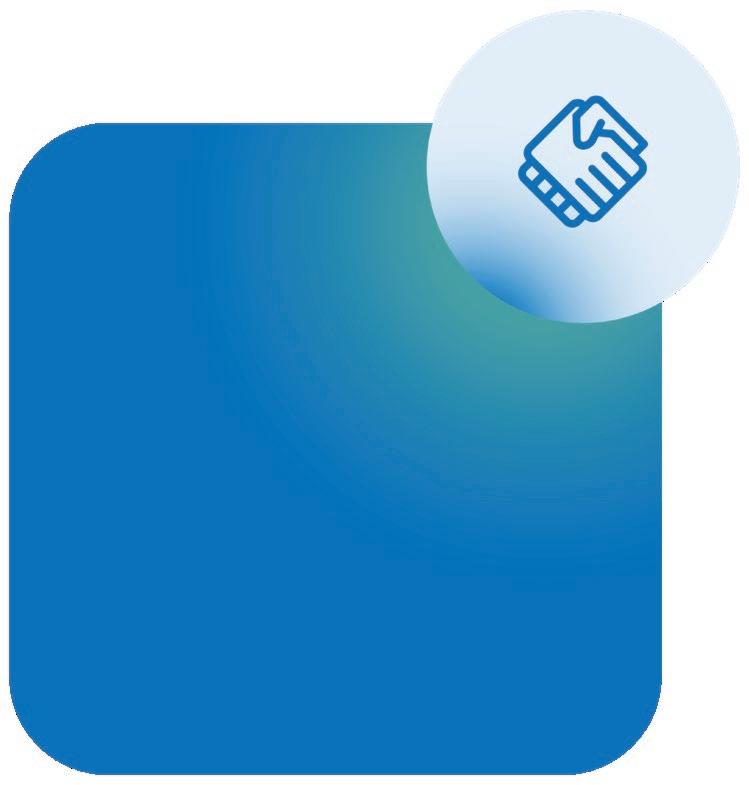
“the majority of consultancy contracts awarded in 2024 - 106 out of 146 - were won outside the Region, representing a total value of approximately $7.5 million”
“the value of consultancy contracts awarded to Regional consultants was only slightly lower, totaling around USD7 million across 40 contract”


• In 2024, the highest number of contracts were awarded under Regional projects, totalling 82 contracts with a combined value of USD5.6 million. Among CDB BMCs, Dominica led in terms of contract value, awarding contracts worth a total of USD 43.3 million, followed by Belize (USD 10.5 million) and Saint Vincent and the Grenadines (USD 8.7 million)
A significant portion of the contracts (27) awarded under Regional projects were related to consultancy services under
the Technical Assistance programme titled “Strengthening the Business Management Digitisation and Resilience of Micro, Small, and Medium-Sized Enterprises in the Region”, implemented by CDB. All contracts in this project were secured by consultants and regional organisations registered in various member countries across the Region.
Antigua and Barbuda and Belize awarded the highest number of contracts in 2024, each issuing 21 contracts. Antigua and Barbuda’s contracts, valued at USD 2 million, were mainly for the “Hurricane Irma Rehabilitation and Reconstruction Loan” project.
• Considering awards to bidders from all countries in 2024, Dominica stood out in terms of total contract value awarded, with just two contracts totaling together over USD43 million
This remarkable figure is primarily attributed to a major infrastructure project, where a large Works contract was awarded to a domestic contractor, as mentioned above
Table 1: Top 10 Countries by Total Value of Contracts Awarded to Firms and Individuals Registered in Country in 2024
Saint Vincent and the Grenadines 7,937,400.92
United Kingdom 7,092,449.38
Jamaica 5,686,072.62
Antigua and Barbuda
Saint Lucia
Saint Vincent and the Grenadines
Grenada
Bahamas
Suriname
Dominica
British Virgin Islands
Barbados
Trinidad and Tobago
Anguilla
Montserrat
Saint Kitts and Nevis
Dominican Republic
Haiti
were awarded under Regional projects, which typically involve multi-country initiatives managed by CDB or regional partner organizations.
Canada 5,482,180.60
United States of America 2,363,065.30
Belize 1,953,333.76
Trinidad and Tobago 1,768,847.72
Saint Lucia 1,445,381.53
Following Dominica, the next three largest contracts were also for Works projects:
• The largest of these was awarded in Belize to a United Kingdom-based bidder for USD4.4 million, under the “Seventh Power (Caye Caulker Submarine) project”.
• Saint Vincent and the Grenadines saw a significant contract of USD3.2 million awarded to a local contractor as part of the “Disaster Risk Reduction Programme”.
• Additionally, a Canadian contractor received a major contract in Belize for the supply and installation of submarine cables under the same power project mentioned above.
These four contracts represent the only awards above the USD3 million threshold in 2024, underscoring the prominence of international participation in high-value infrastructure procurement processes.
2:
It can be noted that:
• A significant portion of procurement spending is concentrated on a small number of high-value contracts.
• International bidders continue to secure a notable share of contracts, both in number and value. Nonetheless, they are more likely to participate in, and win, procurement processes involving the supply of specialised Goods or Works not readily available locally. This trend is further supported by data on
bidder participation in CDB-funded projects, as detailed in the ICB Threshold Analysis in Section 1.
• As further explained in this analysis, local suppliers and contractors remain the primary source of Goods and Works, a trend that aligns with findings from previous years. This indicates that CDB-funded procurement contributes to strengthening domestic industry and supports the broader economic development in BMCs.
• In 2024, 145 contracts - representing 75.5% of the 192 contracts awarded - were awarded to firms, individuals and organizations10 located in CDB’s BMCs. These contracts had a combined value of approximately USD 66.5 million, accounting for approximately 80% of the tota procurement value.
This figure represents the second-highest number of contracts awarded to regional bidders in a single year, following the 2020 peak of 140 contracts. However, in terms of total value, 2024 also recorded the lowest annual value of contracts awarded to regional firms during the 2020–2024 period. This may be attributed to the particularly high number of
“Saint Lucian firms and individuals received the highest number of contracts in 2024, with a total of 25 awards.”
consultancy services contracts (typically of lower value compared to goods and works contracts) as well as several relatively small-value goods contracts.
• Among regional bidders, Saint Lucian firms and individuals received the highest number of contracts in 2024, with a total of 25 awards. Of these, 13 were for activities within Saint Lucia, while 12 were secured through participation in procurement processes in other BMCs.
Saint Lucia was followed by Saint Vincent and the Grenadines and Trinidad and Tobago (16 contracts each), and Barbados and Belize (15 contracts each)
Notably, all contracts awarded to bidders from Trinidad and Tobago (16) and Jamaica (15) were secured outside their home countries, reflecting a strong regional presence and the capacity of these firms to compete successfully across the national borders.
Belizean bidders secured 14 of their 15 contracts within Belize, indicating robust local participation in CDB-funded procurement. This trend is further supported by the relatively high number of projects and procurement opportunities available in Belize, reinforcing strong engagement of the domestic market.

Awarded Outside Country % Awarded in Country
Country of Awarded Contract
This chart shows the percentage of contracts awarded to bidders from each country in 2024, distinguishing between contracts won within their country of registration (“In-Country”) and outside it (“Outside Country”). It aims to highlight the propensity of bidders from each country to participate in procurement processes and secure contracts, including their ability to compete successfully outside their home country.
• Countries with a higher percentage of “In-Country” awards may demonstrate stronger success in their domestic markets.
• Countries with a higher percentage of “Outside Country” awards may indicate greater regional reach and competitiveness of their bidders.
While this provides insights into procurement dynamics, several limitations should be noted: 1) it reflects only awarded contracts, not the number of bids submitted or the success rate of bidders; 2) countries with fewer available project procurement opportunities may appear less competitive. Also, the analysis excludes countries without awarded contracts in 2024.
• In 2024, 48 contracts - valued at USD 16.8 millionwere won by bidders from countries outside the Caribbean region, representing 24.5% of all contracts and 20.1% of the total procurement value.
These awards include firms registered in both non-Borrowing CDB member countries (namely Brazil, Canada, Colombia, Mexico, Italy, and the United Kingdom) and in countries which are not member of CDB. While CDB-financed procurement is typically limited to firms from the Bank’s member countries, some projects expand eligibility to non-member firms, particularly where CDB is using fund sources from partners that require wider eligibility, which explains their presence in the data.
Of the 48 contracts awarded to bidders from non-borrowing member countries in 2024:
• 31 contracts - valued at approximately USD 13.7 millionwent to firms from non-borrowing CDB member countries.
• 17 contracts, valued at USD 2.9 million, were awarded to firms from non-CDB member countries - the highest annual number of such awards over the past four years.
These non-member firms included suppliers and consultants from Bahrain (1), Finland (1), the United States (9), Spain (2), Costa Rica (1), France (1), and Kenya (1) . Notably, U.S. firms received USD 2.3 million of the total value awarded to non-member countries.
Among all non-borrowing member countries awards, last year bidders from the United Kingdom, Canada, and the United States captured the largest share of contract value, followed by Italy. Excluding two major works contracts referenced earlier, 40 of the 48 contracts - with a total value of USD 7.5 million - were for consulting services, while the remaining 5 contracts were for goods.
Over the past four years, bidders from CDB BMCs countries have been awarded contracts totalling more than USD 610 million. Firms and individuals from non-Borrowing CDB member countries secured a combined value of USD 421.3 million, while bidders from non-member countries were awarded contracts valued at USD 51.7 million
When considering the number of contracts awarded, bidders from Belize were awarded the highest total number of contracts (117), followed by Saint Lucia (79), Jamaica (62), and Saint Vincent and the Grenadines (58) during this period. In terms of the total procurement value, Canadian bidders were awarded the highest amount, with contracts totalling USD 186.5 million, followed by Brazil (USD 155.6 million) 11 and Belize (USD 119.5 million).
As for awards to CDB non-borrowing member countries, the 2024 statistics align with trends observed over the 2020–2024 period, during which the United Kingdom secured the most contracts (53), followed by Canada (36) and Italy (14) Considering total procurement value awarded to non-Borrowing members, the largest share of contracts was also awarded to bidders from Canada (USD184.5 million), followed by Brazil (USD155.5 million) and United Kingdom (USD24.4 million).

As Caribbean countries seek to modernise their procurement systems and build stronger institutions, CDB continues to play a catalytic role in supporting these transformations. This section summarises key procurement reform and capacity building activities that CDB supported in 2024, as well as those that are in planning for the near future. The section also shares reflections from stakeholders who are directly leading reforms in their countries, offering insight into the challenges faced, innovations adopted, and early outcomes observed.

The Bahamas: the new Procurement Regulations, finalised in 2024 with assistance from CDB and the IDB, following CDB and IDB support for the drafting of the Public Procurement Act (2023).
Belize: In 2024, the drafting of a new Public Procurement Act was completed, with final refinements expected to be concluded in early 2025 through a joint CDB-IDB technical working group. During 2024, CDB and IDB also supported the development of implementing Regulations, including provisions to enable the use of e-procurement and Sustainable Public Procurement (SPP) implementation, which are to be finalised in 2025.
CARICOM Secretariat: In 2024, CDB approved a grant to the CARICOM Secretariat to assess their procurement systems and manual to inform down-stream reform. The assessment is expected to be undertaken in 2025.
Main accomplishments in procurement reforms during 2024 are summarised below.
British Virgin Islands: a complete set of Standard Bidding Documents (SBDs) for Goods, Works, and Services, as well as Evaluation Report Templates, were developed and finalised with CDB’s support during 2024.
Antigua and Barbuda: Revised version of Procurement Act and Regulations have been finalised with CDB support and expected to enter into force in 2024. CDB also liaised with the Canadian-Caribbean Emergency Resilience Facility to ensure Emergency Procurement Regulations there were financing aligned with the wider Procurement Framework.
Dominica: Having previously supported the government to develop the Public Procurement and Contract Administration Act (2021), and the supporting Regulations (2022), in collaboration with the World Bank, CDB provided further support to develop standard bidding documents (SBDs), which are harmonised with similar SBDs expected to be introduced in Grenada, Saint Lucia and St. Vincent and the Grenadines. CDB expects to partner with the World Bank to provide training on the SBDs and to members of the Procurement Board and Review Council in early 2025.
Saint Vincent and the Grenadines: CDB financed the development of a Procurement Manual, which was finalised in 2024. In collaboration with the WB, CDB also assisted in reviewing a set of SBDs, which are consistent with the aforementioned documents prepared for Dominica.
Saint Lucia: In 2024, CDB, in collaboration with the World Bank, supported the review of the Public Procurement Act (2015) and its Amendment and the associated Public Procurement Regulations, to propose enhancements and address inconsistencies.
Suriname: In November 2024, Suriname’s National Assembly (DNA) approved the Procurement Act, with unanimous support. The momentum for reform was reignited in October 2024, with a strong emphasis on promoting transparency and efficiency in public procurement. This development followed a prolonged process of legislative review that began several years ago, closely tied to the revision of the Accounting Act. During this period, CDB’s PPU had provided feedback to the Ministry of Finance on the draft Procurement Act. The renewed discussions in 2024 were instrumental in finalizing the Act.
Building Activities: Progress in 2024
• Inter-American Network on Government Procurement (INGP) activities
Participation in the XVIII Annual Conference of the INGP
Between February 21 and 23, 2024, Directors of Public Procurement from CDB’s Caribbean BMCs, along with a CDB delegation, participated in the XVIII Annual Conference of the Inter-American Network on Government Procurement (INGP)12, held in Asunción, Paraguay13. The event was hosted by Paraguay’s National Directorate of Public Procurement (DGCP) and co-organised by CDB, the Organization of American States (OAS) - which serves as the Technical Secretariat of the INGP -, the IDB, and the DGCP.
The INGP serves as a high-level platform for horizontal technical cooperation among OAS member states, which encompass all of CDB’s BMCs. Its Annual Conference convenes procurement directors from regional governments, representatives of international and regional organisations, civil society actors, academic institutions, and procurement professionals to exchange regional experiences and explore emerging global trends and challenges in public procurement.
Last year, CDB sponsored the participation of the heads of public procurement and focal points from eight of its BMCs14 at the conference, plus one speaker. This support, ongoing since the previous years, is aligned with the Bank’s commitment to strengthening regional procurement capacity and fostering collaboration.


Officer, Government of Saint Lucia); Ms. Nioan Emmanuel (Secretary to the Central Procurement Board, Government of Saint Lucia); Mr. Drexel Glasgow (Director, Central Procurement Office, Government of the British Virgin Islands); Ms. Stacey Browne (Budget Director, Ministry of Finance and Economic Planning, Government of Saint Vincent and the Grenadines); Ms. Lavern Queeley (Director, Department of Economic Affairs, Government of Saint Kitts and Nevis); Ms. Ludiane Leveret-Richardson (Chief Procurement Officer, Ministry of Finance, Government of Anguilla)
The central theme of the 2024 Conference was “Promoting Development with Public-Private Collaboration through State Procurements.” During last year’s event, CDB’s Head of Procurement, Mr. Douglas Fraser, led a panel discussion focused on strategies and tools to build stronger intersectoral alliances between stakeholders in the procurement process. The panel featured representatives from the US White House Office of Federal Procurement Policy, the Chamber of Commerce and Services of Paraguay, Robinson Global Management, and the Paraguayan Road Chamber. Other key topics discussed during the event included regional innovation in procurement practices, transparency and data openness, legal and regulatory frameworks, inclusive procurement, and professionalisation of the procurement function.
According to Mr. Douglas Fraser: “The INGP plays a critical role in sharing best practice and building technical networks across the Caribbean and beyond and the 2024 annual conference allowed participants to deepen their knowledge in areas, including sustainable procurement, professionalisation, integrity and digitisation, which can now be applied under action plans that were developed at the event.”
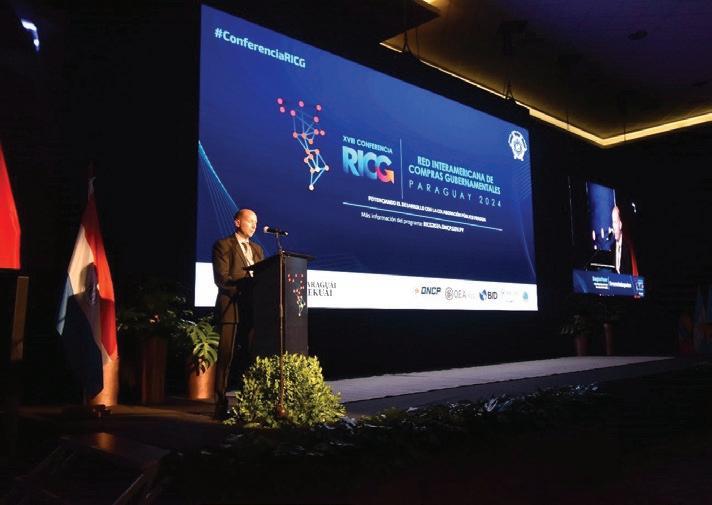
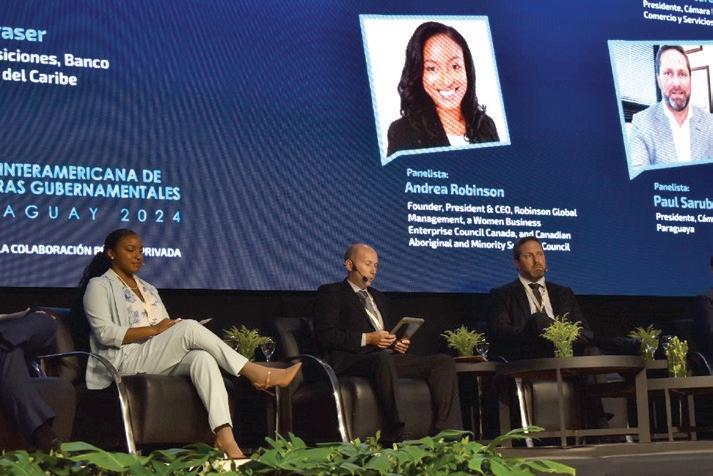
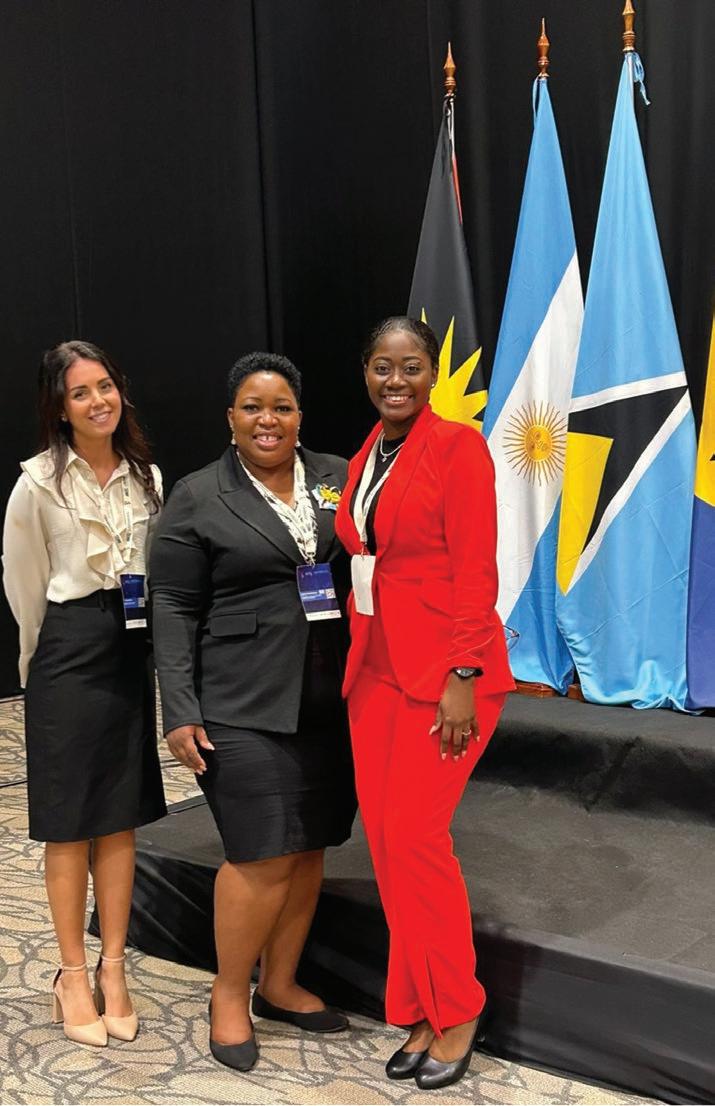

The final day of the Conference featured a closed-door session where INGP member countries and institutional partners reflected on the progress and future direction of procurement reform in the Region. CDB reaffirmed its readiness to support its client countries and work collaboratively with the INGP to advance reform agendas.
Reflecting on the event, Ms. Ludiane Leveret-Richardson, Chief Procurement Officer, Ministry of Finance, Government of Anguilla noted that conferences like INGP help smaller islands that are still in the infancy or youth phases of procurement to learn about evolving strategies being used to progress procurement in some of the more advanced islands/countries.
She added: “From this year’s conference, my two key takeaways were the importance of professionalisation of our procurement functions and the transformative power of public procurement. Professionalisation equips practitioners with the necessary skills, knowledge and capabilities to execute their duties in adherence to procurement legislation. Meanwhile, public procurement can be the key to ensuring that an organisation operates as a single unit towards the achievement of its objectives. It can act as a positive engine
for change in terms of innovation, sustainable practices, and being a catalyst for improvements in the achievement of value for money.”
Fellow participant, Mr. Sean Cenac, Permanent Secretary, Ministry of Works, Government of Antigua and Barbuda described the event as an example of how shared challenges, can generate shared solutions. He added, “The XVIII INGP Conference continues to strengthen professional relationships, serve as a medium for information exchange and an impetus for advancing procurement systems among its participating member-countries. This year’s conference recognised professionalisation and collaboration as official themes (among other vital strategies) that dominated side discussions”. For Antigua and Barbuda, the Conference reinforced how important it is to establish procurement fundamentals, while expanding and engendering stakeholder communities within a common objective. The INGP Conference has grown to be a vital institution offering a combination of technical and policy-level knowledge that promote insights and pathways to modernise procurement systems.
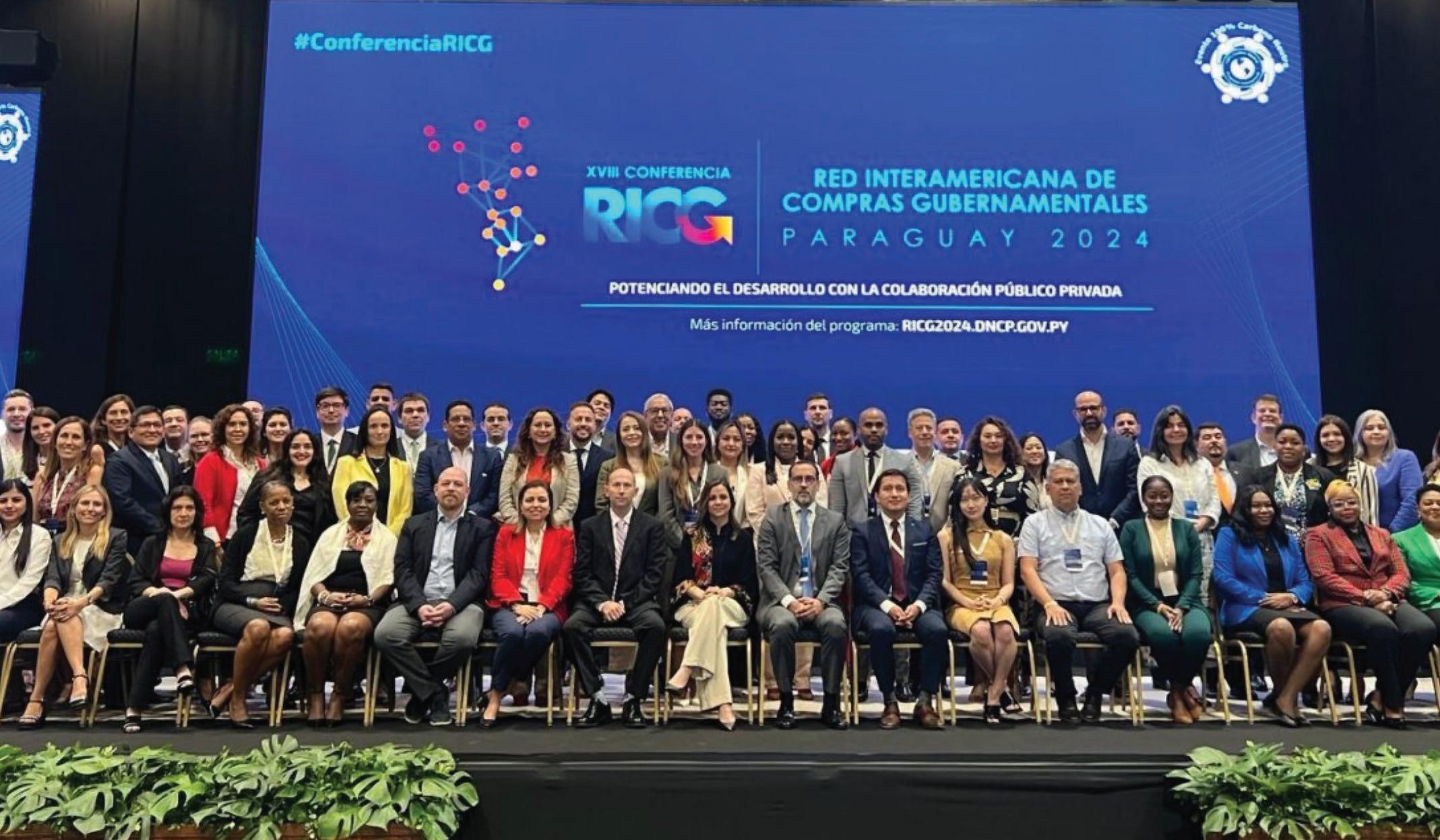
At the close of the Conference, INGP members, including CDB and its BMCs—formally adopted a regional Declaration on “Enhancing Sustainability through Public Procurement15”. The Declaration sets out priority actions in areas such as policy reform, gender-responsive procurement, professionalisation, transparency, and collaboration with the private sector. It provides a framework for advancing sustainable and inclusive development through strategic procurement and aligns with CDB’s ongoing efforts to promote sustainability and innovation in procurement across the Region.
By participating in the INGP network, countries benefit from access to valuable knowledge and resources that support their public procurement modernisation strategies. Recognizing the importance of equipping countries with the necessary skills and tools to effectively implement reforms, CDB has played a key role in facilitating the participation of national procurement directors in INGP-led initiatives and events, including thematic workshops and the Annual Procurement Conference.
In addition, CDB has contributed to the development and dissemination of tools and resources for Caribbean members of the network. Notably, CDB financed the English translation and digitalisation of an online course on the Digital Transformation of Public Procurement16, developed by the OAS School of Government. The course is expected to launch in late 2025, and CDB will offer 19 partial scholarships for participants from its BMCs. Interested individuals are encouraged to stay informed for updates on the start of the selection process.
CDB has financed the official English translation of the Sustainability Self-Assessment Tool for Contracting Entities (ASEC), originally developed by the INGP in Spanish. ASEC is an online diagnostic platform designed to help public contracting entities assess and strengthen their Sustainable Public Procurement (SPP) practices. Upon completion of the
self-assessment, users receive a detailed report outlining their performance along with tailored recommendations for improvement. The tool is available at: RICG - Red Interamericana de Compras Gubernamentales.
To support regional awareness and uptake, a webinar was held in April 2024 to present the tool to CDB’s BMCs and to gauge interest in its application. This initiative complements CDB’s broader efforts to promote sustainable procurement practices across the Region, in alignment with international standards and partner initiatives.
To further its support for procurement professionalisation, CDB has also supported the following initiatives
• Procurement Scholarship Initiative
To advance the professionalisation of public procurement in the Caribbean, CDB continues to invest in the development of highly skilled procurement practitioners including through its Procurement Scholarship Initiative. While many CDB BMCs have introduced significant reforms to modernise procurement frameworks, with CDB and other development partners playing a key supporting role, the need for qualified professionals to implement and sustain these reforms remains critical. Across the Region, access to specialised postgraduate training in public procurement for procurement leaders is still limited, creating a persistent capacity gap.
In response to this constraint, over the past three years, the Bank has supported a growing number of regional professionals to pursue the International Master’s in Public Procurement Management (IMPPM) programme, held at the University of Rome Tor Vergata, Italy. This support is made possible thanks to Technical Assistance funds provided to CDB by the Government of Italy to support procurement capacity strengthening and reform initiatives. IMPPM is internationally recognised as a leading post-graduate procurement master, and equips participants with advanced knowledge and tools to drive procurement reform, promote efficiency, and improve governance.
In 2024, CDB’s scholarship awardee Ms. Amoi Romeo
(Technical Advisor to the Secretary of Finance at the Division of Finance, Tobago House of Assembly) successfully completed her IMPPM journey. Following four and a half months of intensive in-person training in Rome, Ms. Romeo returned to Tobago in mid-2024 to undertake her traineeship and complete her dissertation remotely. She later returned to Rome in February 2025 to defend her thesis and attend the
graduation ceremony17. Her dissertation focused on strategies to enhance the participation of Small And Medium-sized Enterprises (SMEs) in public procurement. According to Ms. Romeo, the knowledge gained through the programme will allow her to effectively contribute to ongoing procurement reform efforts in her country.
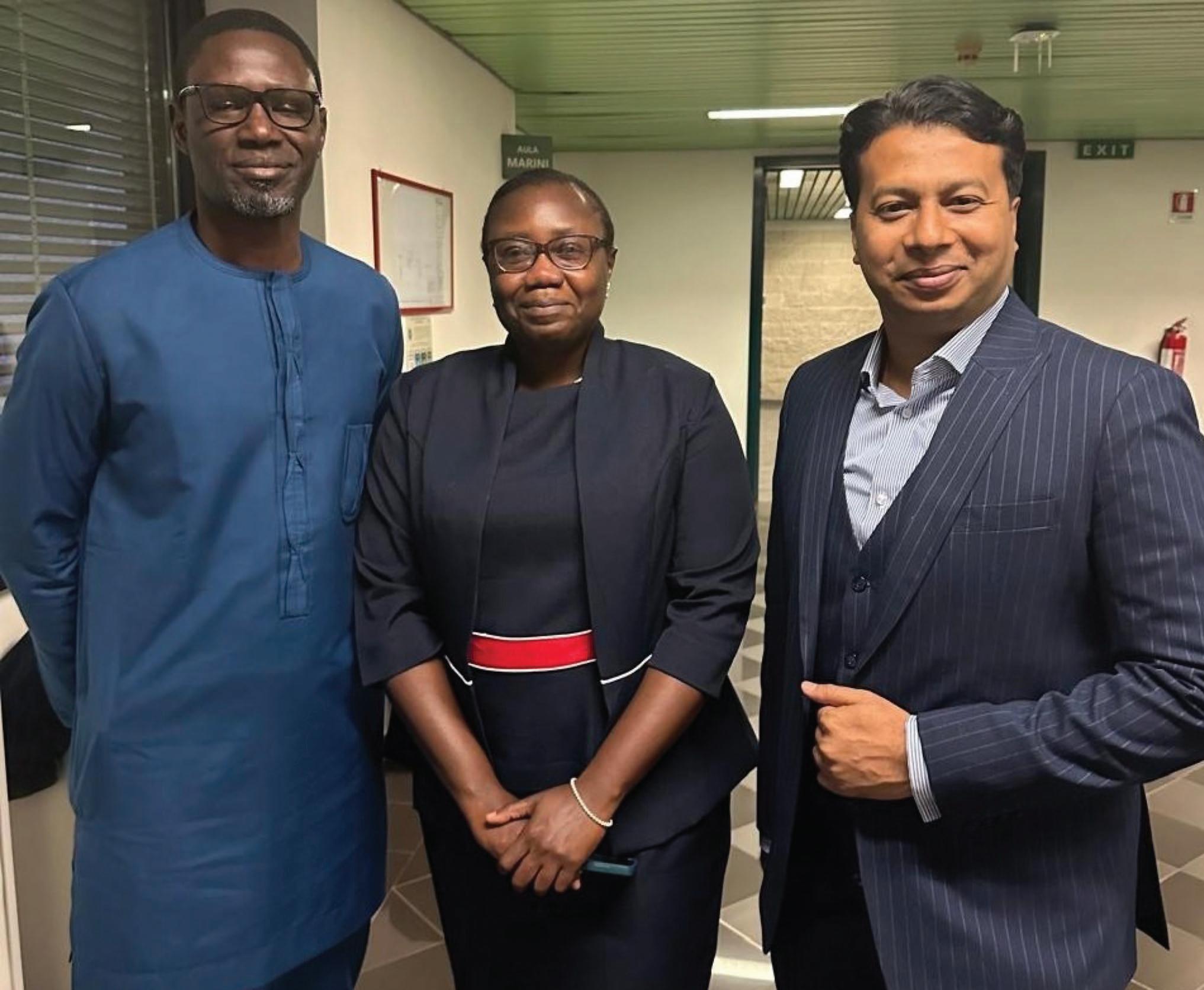
“I am grateful to the Caribbean Development Bank for giving me the incredible opportunity to attend the IMPPM. This master’s programme deepened my understanding of public procurement and its role in the economic development of the Caribbean. My dissertation on Increasing the Participation of SMEs in Public Procurement Contracts explored innovative strategies to support the Region’s fiscal development. The IMPPM has already had—and will continue to have—a meaningful impact on public procurement practices across the Caribbean and Latin America. I am thankful for the opportunity to contribute to its advancement.”
The CPTP - established with financial support from both CDB and the World Bank - is designed to enhance procurement governance and institutional capacity across the Caribbean. The programme aspires to become a recognised Centre of Excellence for Procurement in the Region. Accredited by the Chartered Institute of Procurement and Supply (CIPS), it offers the CIPS Level 4 Diploma and Level 5 Advanced Diploma in Procurement and Supply.
Recognising the growing regional demand for procurement expertise, CDB has continued to partner with the IDB for providing procurement scholarships for the 2025/2026 academic year. Following a joint selection process carried out during 2024, three exceptional professionals were awarded scholarships: Robert Tatum, Deputy Director at the Central Procurement Office of the Cayman Islands (CDB’s 2025 scholarship awardee); Tamara Roberts, Project Officer at Trinidad and Tobago’s Water and Sewage Authority (WASA); and Angeles Itzab, Senior Procurement Officer at the Belize Social Investment Fund. All three are now in Rome, embarking on what promises to be a transformative professional journey.
Through this initiative, CDB is helping to build a new generation of procurement leaders across the Caribbean, equipping them not only with academic credentials, but with the strategic insight and international exposure needed to champion reforms, foster transparency, and deliver better public outcomes for the Region. Over the past three years, eight (8) regional professionals have successfully completed the programme, bringing valuable expertise back to their home countries.
• Caribbean Procurement Training Programme
In 2024, as part of its ongoing commitment to advancing procurement professionalisation across the Region, CDB continued to sponsor procurement professionals from its BMCs to participate in specialised public procurement training delivered by the Caribbean Procurement Training and Consultancy Programme (CPTP) at the University of Technology (UTech), Jamaica.
Reflecting a strong emphasis on regional inclusion, the programme draws participants from across the Caribbean countries, fostering a rich environment for collaborative learning and cross-cultural exchange. Participants include both emerging professionals entering the field and experienced practitioners seeking to enhance their technical competencies. The programme effectively supports:
• Career transitions into the procurement profession; and
• Skills upgrading for those already engaged in procurement roles.
Comprehensive data on enrolment and completion rates for the 2024–2025 academic cycle will be presented in the 2025 Procurement Annual Report.
To enhance procurement capacity across its client countries, CDB offers a comprehensive suite of online procurement training courses aligned with its new Procurement Framework. These courses are available at no cost to CDB clients and staff, providing accessible, flexible, and self-paced learning opportunities.
Hosted on CDB’s e-Learning Platform, the training program includes three modules:
• Course 1: Introduction to Procurement on CDBFinanced Projects, covering the fundamentals of procurement processes under CDB-financed operations.
• Course 2: Procurement of Consulting Services, focusing on the selection and management of consulting services in line with CDB guidelines.
• Course 3: Procurement of Goods, Works, and NonConsulting Services, providing guidance on the procurement of a wide range of goods, works, and non-consulting services.
The courses were upgraded in 2023 to ensure alignment with the latest procurement policies and best practices, further enhancing their relevance and effectiveness.


• What benefits can be expected from the training? Gain familiarity with the requirements of CDB’s procurement framework, which promotes smooth and effective project implementation. In addition, a certificate of completion is released upon successful completion of each course, resulting in 3 separate certificates being earned.
• Who can register? 1) Non-CDB personnel: Staff at Implementing/Executing Agencies responsible for procurement planning or oversight activities in CDB-financed projects; 2) CDB personnel: all interested CDB staff members and specifically CDB staff with supervisory roles for CDB-funded projects.
• How much time is needed to complete the course? All three courses can be completed in collectively approximately 20 contact hours and are self-paced.
For further information including content, timelines and registration modalities, please see Procurement Training | Caribbean Development Bank (caribank.org) or contact procurement@caribank.org
In 2024, participation in the CDB Procurement E-Learning courses showed a remarkable increase compared to 2023, with significant growth in enrolments for almost all courses. Statistics including variations in enrolment and completion rates with respect to 2023 are as follows:
The majority of participants were representatives from implementing/executing agencies of CDB-funded projects, governments, regional organisations, and fellow development banks. Therefore, the Procurement e-Learning Training complements other CDB’s efforts to support procurement capacity development in its client countries.
(19) The low participation rate for Course 1 (“Introduction to Procurement”) in 2023 can be attributed to its standalone launch already in 2022, which was successfully completed by more than one-hundred and ten (110) participants. It is plausible that, in 2023, many of these participants may have transitioned to Courses 2 and 3, which are now also accessible.


Project procurement presents a source of business and consultancy opportunities for private sector actors willing to compete for CDB-funded contracts, ranging from small-scale services to the provision of goods and services for large-scale infrastructure works. Such inputs are critical to the success of the Bank’s projects. The private sector is thus a key partner in ensuring the operational success of the Bank. Furthermore, procurement activities have also a direct impact on the economic growth of CDB’s member countries and private sector development. For these reasons, CDB recognises the critical importance of engaging in fruitful exchanges and cooperation with companies and businesses. Therefore, CDB has improved its efforts to deepen the private sector’s understanding of its procurement framework and requirements, to the benefit of higher quality bids and proposals and faster project delivery.
In September 2024, CDB, in collaboration with the World Bank and the OECS Commission, hosted a Procurement Fair at the Harbor Club in Saint Lucia. The event provided participants with insights into procurement opportunities under CDB, WB and OECS Commission financed projects, along with practical tools and guidance for preparing successful bids. It also offered a platform to engage with key representatives from Project Executing Units and the private sector.
Over the course of two days, participants were briefed on procurement opportunities under projects funded by CDB and WB. The programme included a dedicated workshop on bid preparation and accurate financial proposal costing, featuring practical guidance on using the CDB’s Caribbean Technological Consultancy Services (Costing Jobs Estimation Tools).

Feedback from the OECS Procurement Fair participants was overwhelmingly positive - 93% of attendees indicated that the information shared was either extremely useful or somewhat useful. Gender representation was also notably balanced, with many female participants attending as business owners, reflecting growing inclusivity in regional procurement engagement. of attendees indicated that the information shared was either extremely useful or somewhat useful”
“93%
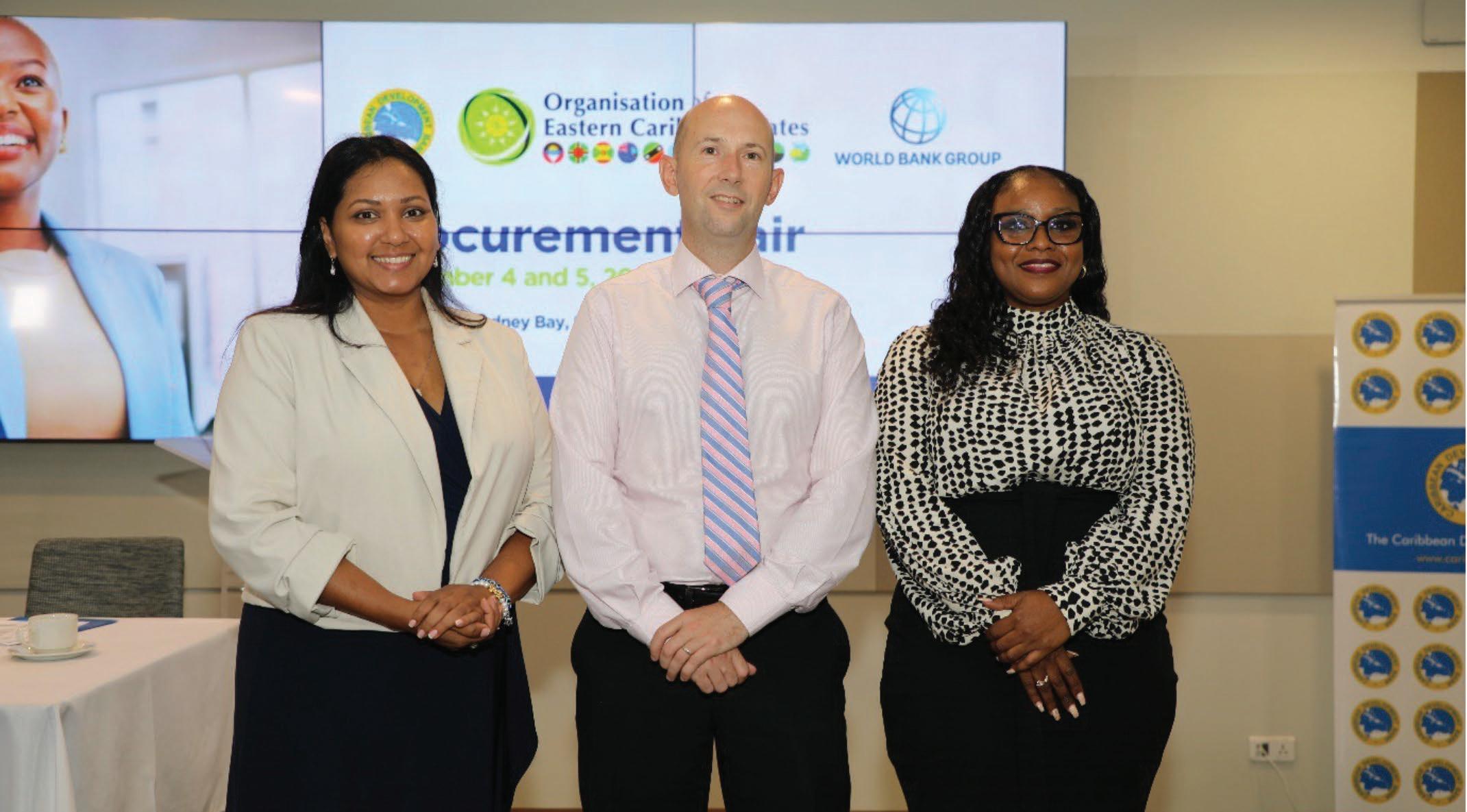


A central focus of the 2024 OECS Procurement Fair was the promotion of inclusive procurement, with particular attention to women-owned and womencontrolled businesses (WOBs) and other groups historically underrepresented in CDB-funded and public procurement processes.
In the Caribbean region, public procurement represents a significant share of national GDP, yet women-owned businesses capture less than 5% of the procurement market. This disparity underscores the need to integrate gender-responsive approaches into procurement systems and outreach efforts.
CDB has made active efforts to enhance inclusivity through targeted engagement. For the 2024 OECS Procurement Fair, this included direct outreach
to WOBs and coordination with local business support organisations to encourage participation and build capacity to compete for opportunities. These efforts build on previous experiences, such as the 2018 Bahamas Procurement Fair, where the focus was on businesses owned or operated by persons with disabilities (PWDs). In that case, CDB and the IDB worked closely with national agencies to ensure meaningful participation of these enterprises.
Through initiatives like these, CDB continues to advance equity and access in procurement, reinforcing the role of inclusive economic growth as a driver of sustainable development.
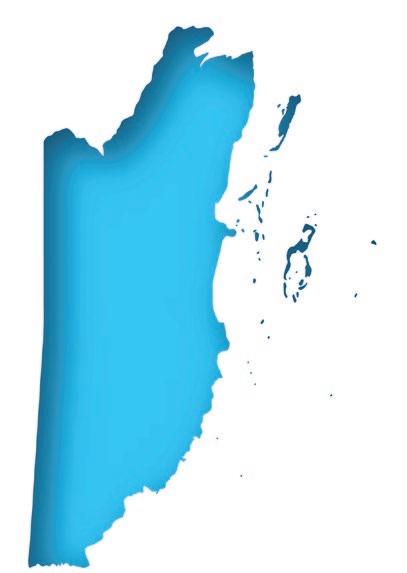
From November 4 to 8, CDB partnered with the Government of Belize and the IDB to host the Belize Procurement Week20 . The event aimed at providing contractors with a clear understanding of the procurement processes of both financial institutions, including the specific requirements for projects financed by CDB and IDB in collaboration with the Government of Belize. Private sector participants were exposed to the nuances and intricacies of these processes, ensuring they
were better positioned to access available opportunities and deliver high-quality bids.
The event also served as a valuable networking platform, allowing local firms to connect with potential partners, explore joint venture opportunities, and enhance their competitiveness. By strengthening the capacity of local suppliers, contractors, and consultants, CDB aims to increase value for money for the beneficiary government, while fostering a more competitive regional private sector.
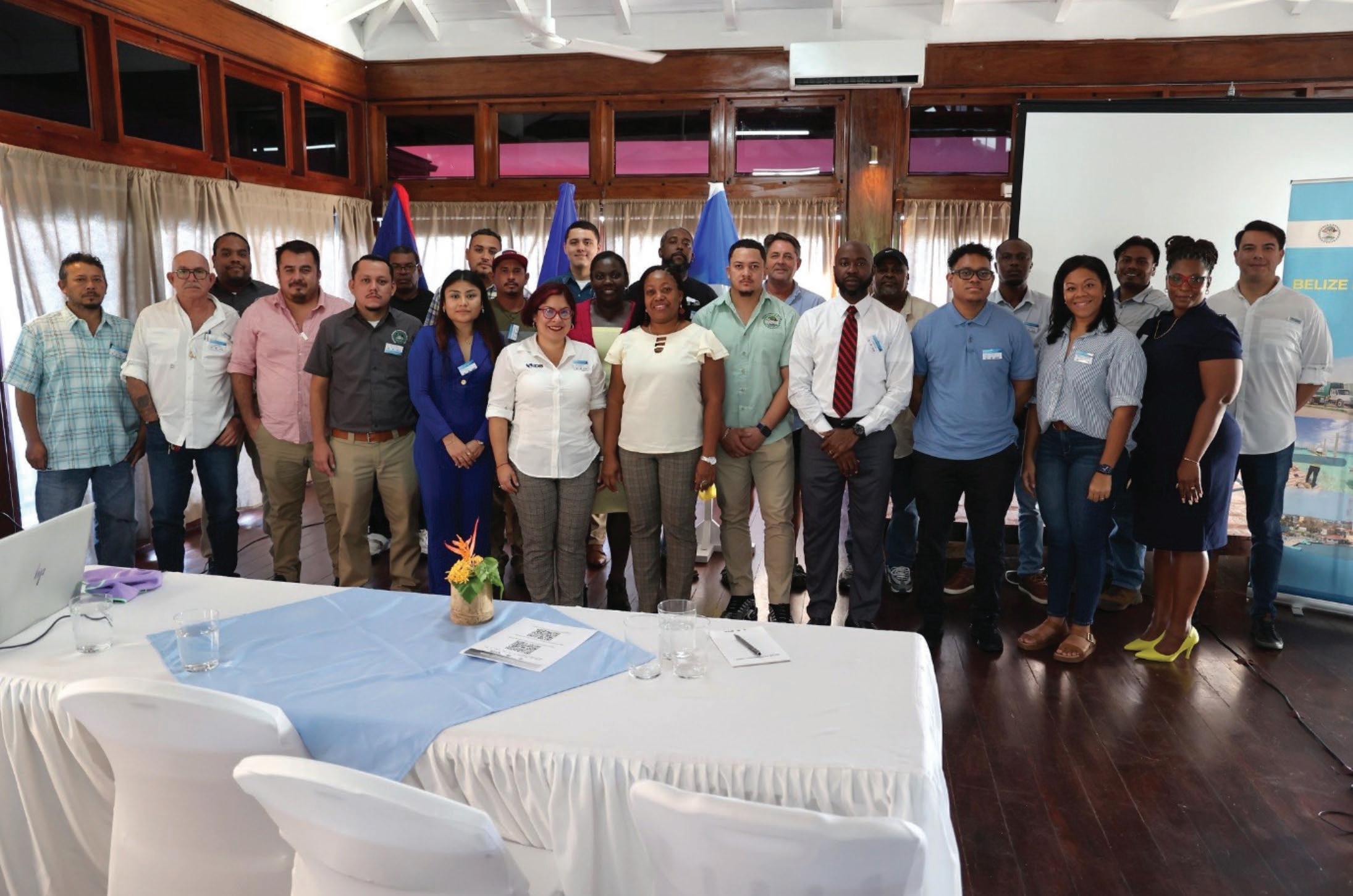
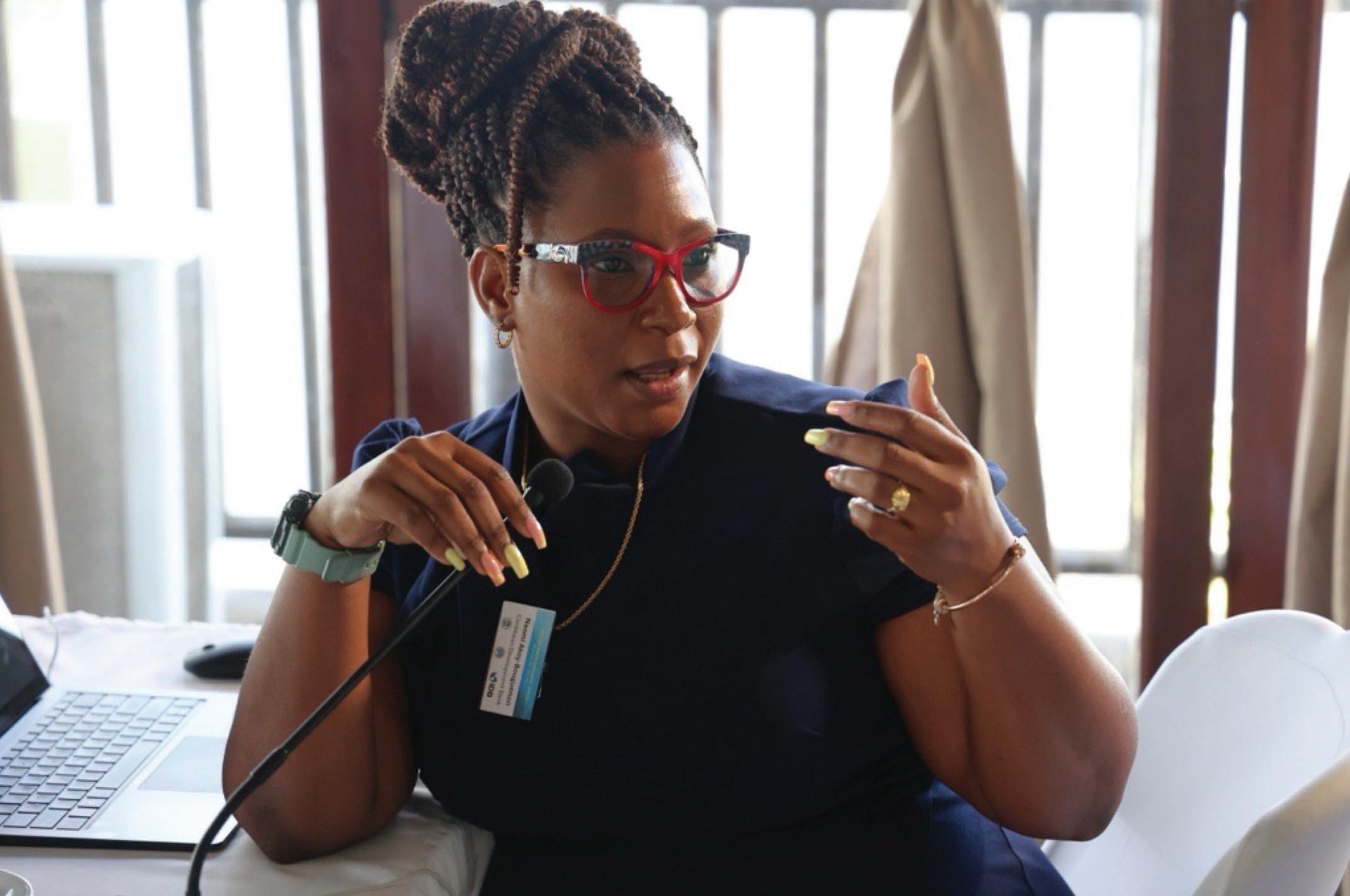

Recognising the importance of continuing to promote similar initiatives, last year CDB decided to allocate additional resources to support the organisation and delivery of procurement fairs across its BMCs over an 18-month period, beginning in January 2024.
In November 2024, CDB participated at the 5th United Kingdom (UK) Trade Mission to Barbados and the Eastern Caribbean. The event, organised by the UK Department for Business and Trade in partnership with Invest Barbados and the Renfrewshire Business Network, welcomed around 15 UK-based firms with expertise in sectors including Education, Renewable Energy, Cyber Security. CDB delivered a presentation on commercial opportunities with International Financial Institutions during the opening day of the event, raising awareness of upcoming CDB project procurement opportunities and of its procurement framework’s requirements.

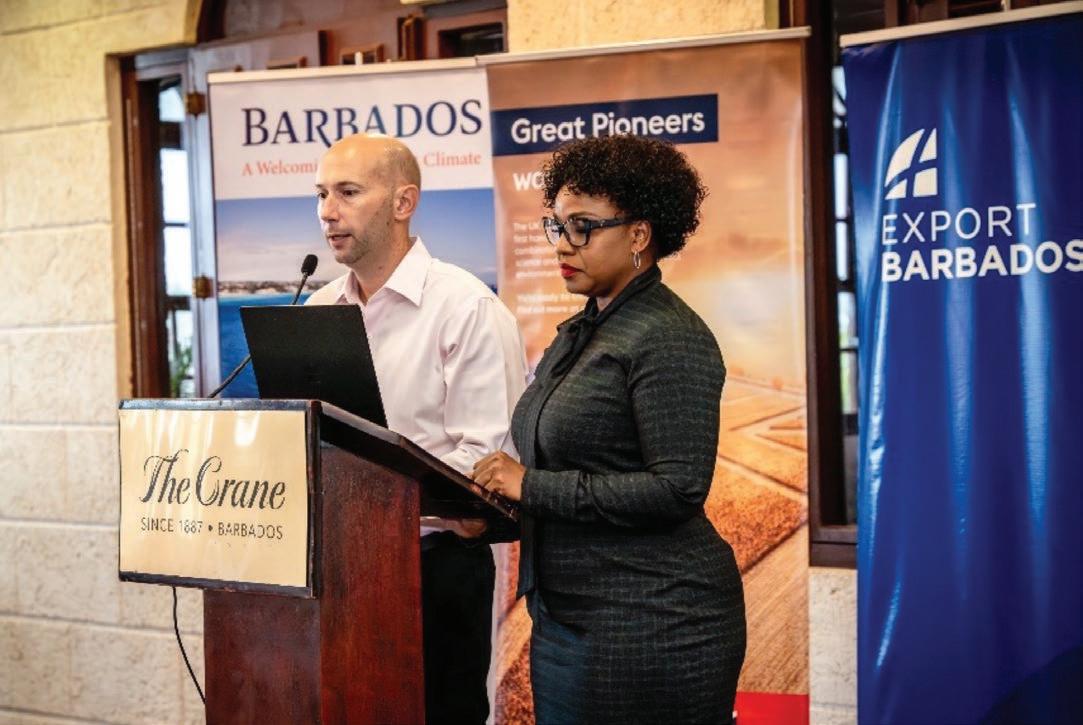
and
CDB maintains a private sector newsletter on procurement opportunities related to its Projects at: Caribbean Development Bank: Sign Up to Stay in Touch (constantcontact.com) and publishes details of all contracts awarded, the procurement for which was subject to CDB’s no-objection.
